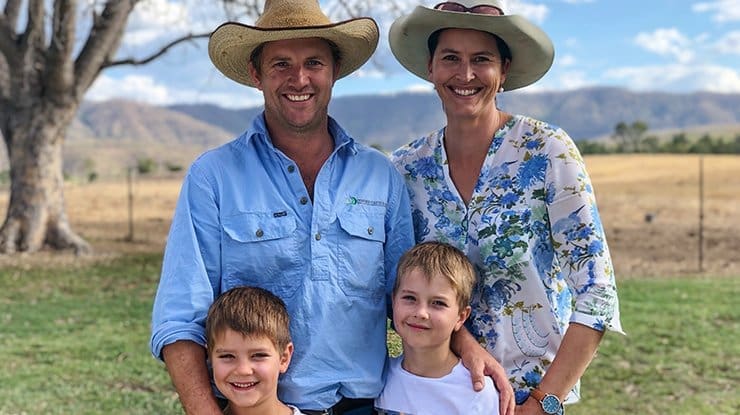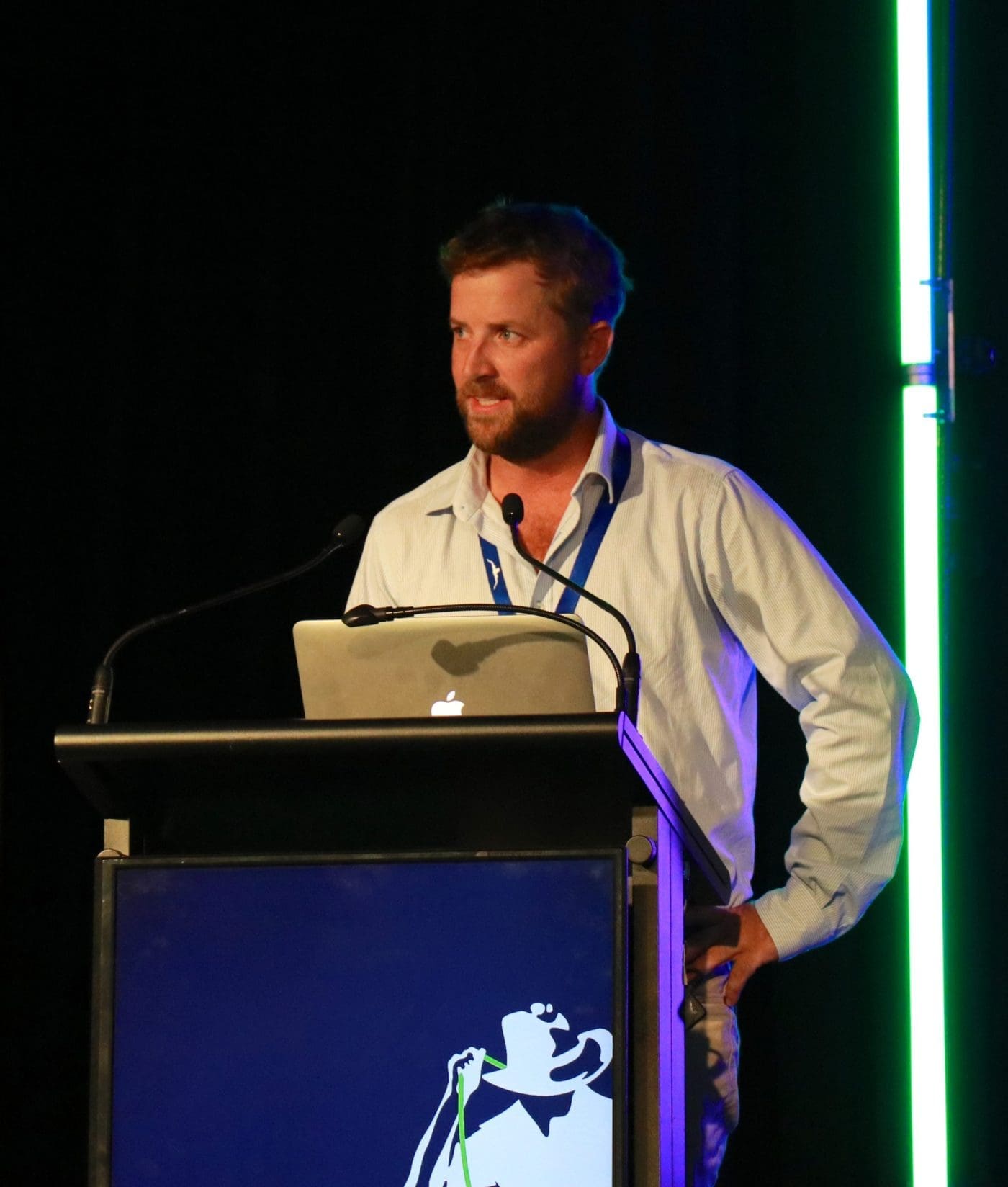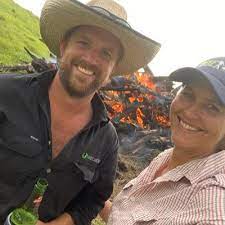
Adam and Jacynta Coffey and their two sons own and operate a 2500 ha cattle grazing business near Miriam Vale in Central Queensland.
ADAM and Jacynta Coffey are young cattle producers who are building their own cattle business from the ground up, using management principles that prioritise pasture diversity, long periods of pasture rest and grass budgeting to guide restocking and destocking decisions.

Adam addressing the AgForce “Red meat under attack” forum at Beef 2021 on Tuesday.
Both are active and popular rural twitter users, but, as Adam told an AgForce forum at Beef 2021 yesterday, he is more introverted by nature and putting his and his family’s story out there “isn’t always easy”.
However, he and Jacynta both strongly believe in the importance of using social media to show people what they do in their beef cattle business, to do their part in trying to counter the misconceptions that seem to be rife in mainstream opinion about agriculture these days.
“I spend a fair bit of time on social media and the main reason I am there is to show people what we do in our beef cattle business,” he explained to the sold out AgForce forum at Beef 2021.
“I communicate with fellow primary producers, consumers, policy makers, people who love our industry, as well as people who hate our industry and everything it stands for.
“The most powerful thing I can do is offer full transparency.
“I enter into many discussions with vegans, environmentalists and others who are driving various agendas in a bid to see our industry suffer.
“But at the end of the day my invitation to come onto our property and see first-hand what we do shuts their arguments down.”
Here ‘by choice’
Adam and Jacynta are “first generation” primary producers.
Both are originally from Tasmania and not from agricultural backgrounds. They worked on and managed properties all over Australia from Western Australia to the Northern Territory, developing and building up their own breeding herd along the way, before investing in owning and developing their own property at Miriam Vale.
They are in the industry “entirely by choice”.

Adam and Jacynta are popular members of the Australian agricultural Twitter community.
“When my wife and I advocate for our industry, it is not due to any historical obligation to be involved, it is because we want to be,” he said.
Through their grazing management they have increased ground cover, nutrient infiltration, prevented run off, reduced erosion and stimulated soil biology.
“All of this is helping us to achieve our production and profitability targets as well as having positive ecological outcomes,” he explained.
“This is in a nutshell is the story we publicly share – productivity, profitability and environmental sustainability.”
Earlier this year Mr Coffey and AgForce, on which he serves as a member of the AgForce Cattle Board, used Twitter to call out Coles for publishing misleading information about beef in one of its monthly magazines.
This led to a meeting of AgForce and Coles executives which resulted in a retraction of the negative statements around health and the environment in relation to the beef industry.
This was one example of how grass roots advocacy can have a genuine and real impact.
However, Mr Coffey said it is clear the industry still “has a very long way to go”.
He said work by AgForce to access satellite vegetation data was helping to prove what the industry has known all along – that Queensland vegetation is thickening, quite the opposite of the alleged deforestation.
“The ball is now shifting strongly to the court of retailers such as McDonald’s who need to decide whether they continue down path of demonising and regulating the Australian beef industry based on myth or help us promote our great environmentally sustainable product.”
“We all need to do our bit”
Ultimately his message to the AgForce forum yesterday was that “we all need to do our bit”.
“Why do so many of us leave it up to industry bodies to advocate solely on our behalf?
“It hasn’t worked that well, and it is far more genuine and effective coming from a producer.
“Of course advocacy from SFOs like AgForce is vital as well as continued support from our peak industry bodies, but in this age of social media and instant information, isn’t it time we got more proactive ourselves?”
Benefits from social media interaction
Mr Coffey said some of the opportunities that had come his way through his engagement on Twitter had been “amazing”.
“It is a great way to keep abreast of what is going on in agriculture and on a global scale, and we certainly have adopted new ideas, management techniques, and information into our business as a result.
“It gives you an ability to reach out to a wider audience through social media.”
One story in particular helped to illustrate the value he draws from his social media interaction.
“Many people I interact with in urban areas have a huge curiously about what we do on a daily basis and a real desire to connect to where their food comes from.
‘I was sent a private message from a guy a while back, he was a computer programmer from western Sydney’
“I was sent a private message from a guy a while back, he was a computer programmer from western Sydney.
“He had no idea about agriculture and he lived in the city all his life.
“He said he really enjoyed following what we do.
“He also went one step further. He said now that when his family sit down for dinner and talk about agriculture, he feels he has something to add to the conversation to what he has learned through my posts.
“So when at times I think I can’t be bothered with it anymore I remember that conversation.
“Our story is such a good one, we need to get off the back foot and tell the good stuff on a positivity attack.
“As an industry we have been o the back foot for too long and it is time we seized the opportunity to take back a narrative that has proven what we have known all along that beef cattle production in Australia is an ethical sustainable industry that turns off a world class product so we need to shout it from the roof tops.”
- Adam and Jacynta’s story featured on ABC Landline on Sunday – to see more click here
This article has been updated since it was first published to remove a reference to Coles’ range of ‘Stickeez’ plastic figurines not containing a ‘red meat’ version. A Coles spokesperson has advised the range does include a ‘burger’ figurine which represents red meat.



Great to hear the drive an passion from young producers having a serios crack. Hat’s off to you guy’s, well done.
This is fantastic; well-done Adam and Jac.
I’ll see you on the Twittersphere